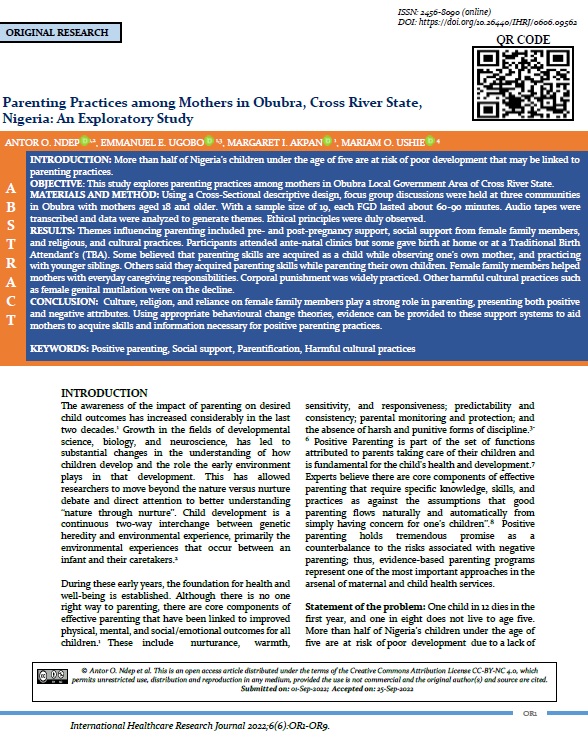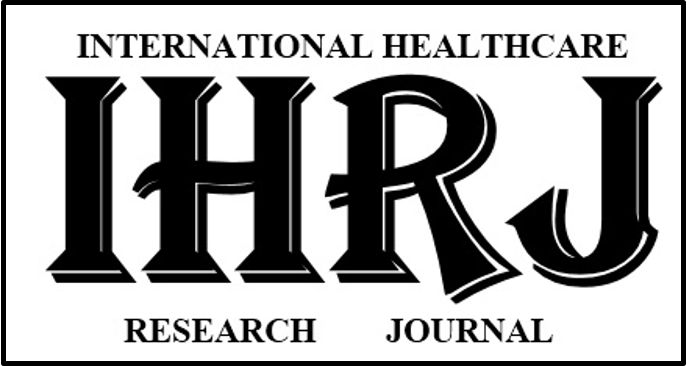Parenting Practices among Mothers in Obubra, Cross River State, Nigeria: An Exploratory Study
Abstract
INTRODUCTION: More than half of Nigeria’s children under the age of five are at risk of poor development that may be linked to parenting practices. OBJECTIVE: This study explores parenting practices among mothers in Obubra Local Government Area of Cross River State. MATERIALS AND METHOD: Using a Cross-Sectional descriptive design, focus group discussions were held at three communities in Obubra with mothers aged 18 and older. With a sample size of 19, each FGD lasted about 60-90 minutes. Audio tapes were transcribed and data were analyzed to generate themes. Ethical principles were duly observed. RESULTS: Themes influencing parenting included pre- and post-pregnancy support, social support from female family members, and religious, and cultural practices. Participants attended ante-natal clinics but some gave birth at home or at a Traditional Birth Attendant’s (TBA). Some believed that parenting skills are acquired as a child while observing one’s own mother, and practicing with younger siblings. Others said they acquired parenting skills while parenting their own children. Female family members helped mothers with everyday caregiving responsibilities. Corporal punishment was widely practiced. Other harmful cultural practices such as female genital mutilation were on the decline. CONCLUSION: Culture, religion, and reliance on female family members play a strong role in parenting, presenting both positive and negative attributes. Using appropriate behavioural change theories, evidence can be provided to these support systems to aid mothers to acquire skills and information necessary for positive parenting practices.
Downloads
References
NASEM. Parenting Matters: Supporting Parents of Children Ages 0-8 Washington DC: The National Academies Press; 2016.
Ward H, Brown R, Westlake D. Safeguarding Babies and Very Young Children from Abuse and Neglect: Jessica Kingsley; 2012.
Elmore CA, Gaylord-Harden NK. The Influence of Supportive Parenting and Racial Socialization Messages on African American Youth Behavioral Outcomes. Journal of Child and Family Studies. 2013;22(1):63-75.
Joussemet M, Mageau GA, Koestner R. Promoting Optimal Parenting and Children’s Mental Health: A Preliminary Evaluation of the How-to Parenting Program. Journal of Child and Family Studies. 2014;23(6):949-64.
Khaleque A. Effects of Multiple Acceptance and Rejections on the Psychological Adjustment of Children and Adults: A Multi-Cultural Study. Disabilities and Impairments. 2014;28:1-15.
Underdown A, Norwood R, Barlow JJT. A Realist Evaluation Of The Processes And Outcomes Of Infant Massage Programs. Infant Mental Health Journal 2013;34:483-95.
Lopes MDSDO, Dixe MDACR. Positive parenting by parents of children up to three years of age: development and validation of measurement scales. Revista Latino-Americana de Enfermagem. 2012;20(4):787-95.
Volmert A, Pineau M, Kendall-Taylor N. Talking about Poverty: How Experts and the Public Understand Poverty in the United Kingdom. United Kingdom: FrameWorks Institute; 2016.
UNICEF. Designing Parenting Programmes for Violence Prevention: A Guidance Note. Geneva: United Nations Children's Fund; 2020.
CIA. The World Factbook 2022 [cited 2022 June 21st, 2022]. Available from: https://www.cia.gov/the-world-factbook/countries/nigeria/.
Okeke T, Anyaehie U, Ezenyeaku C. An overview of female genital mutilation in Nigeria. Annals of medical and health sciences research. 2012;2(1):70-3.
WHO. Female Genital Mutilation 2022 [cited 2022 06/21/2022]. Available from: https://www.who.int/en/news-room/fact-sheets/detail/female-genital-mutilation. [Last Accessed on 21st June, 2022]
Afolabi B, Abatan SM. Early Marriage and Its Implications on the Nigerian Economy 2014. Online Article. Available from: https://ssrn.com/abstract=2528255. [Last Accessed on 21st June, 2022]
Amneenah A, Alshalwi MA. Common Breastfeeding Myths in Derna City in the North-Eastern Part of Libya The Egyptian Journal of Hospital Medicine. 2022;87:1932-8.
Ojua TA, Ishor DG, Ndom PJ. African Cultural Practices and Health Implications for Nigeria Rural Development. International Review of Management and Business Research. 2013;2:176-83.
WHO. Female Genital Mutilation Geneva: World Health Organization; 2022 [Available from: https://www.who.int/news-room/fact-sheets/detail/female-genital-mutilation.
UNICEF. Nurturing Care Geneva: UNICEF; 2022 [Available from: https://nurturing-care.org/wp-content/uploads/2021/01/Nurturing_Care_Handbook_01.pdf.
Haga SM, Lynne A, Slinning K, Kraft P. A Qualitative Study of Depressive Symptoms and Well-Being among First-Time Mothers. Scandinavian Journal of Caring Science. 2012;26.
Abdollahi F, Agajani-Delavar M, Zarghami M, Lye MS. Postpartum Mental Health in First-Time Mothers: A Cohort Study. Iranian journal of psychiatry and behavioral sciences. 2016;10(1):e426.
Conti G, Heckman JJ. Understanding conscientiousness across the life course: An economic perspective. Developmental Psychology. 2014;50(5):1451-9.
Gray GR, Totsika V, Lindsay G. Sustained Effectiveness of Evidence-Based Parenting Programs After the Research Trial Ends. 2018;9.
Patton MQ. Qualitative Research. Encyclopedia of Statistics in Behavioral Science: John Wiley & Sons, Ltd; 2005.
Borchet J, Lewandowska-Walter A, Połomski P, Peplińska A, Hooper LM. We are in this Together: Retrospective Parentification, Sibling Relationships, and Self-Esteem. Journal of Child and Family Studies. 2020;29(10):2982-91.
Nuttall AK, Valentino K, Borkowski JG. Maternal history of parentification, maternal warm responsiveness, and children's externalizing behavior. Journal of family psychology : JFP : journal of the Division of Family Psychology of the American Psychological Association (Division 43). 2012;26(5):767-75.
Ulfa M, Husniah WO, Wijaya RS. The impact on culture-based parenting in the disaster-prone environment. IOP Conference Series: Earth and Environmental Science. 2019;235:012099.
Downe S, Finlayson K, Oladapo OT, Bonet M, Gülmezoglu AM. What matters to women during childbirth: A systematic qualitative review. PLoS One. 2018;13(4):e0194906.
Ugobo EE. Knowledge of and Positive Parenting practices among mothers in Obubra Local Government Area, Cross River State, Nigeria. Calabar: University of Calabar; 2021.
Liao W, Chang L, Lee S, Chuang H, Kuo C, Lee M. Parenting Confidence and Needs for Parents of Newborns in Taiwan. 2015;22(2):177-84.
Maonga AR, Mahande MJ, Damian DJ, Msuya SE. Factors Affecting Exclusive Breastfeeding among Women in Muheza District Tanga Northeastern Tanzania: A Mixed Method Community Based Study. Matern Child Health J. 2016;20(1):77-87.
Ella RE, Ndep AO, Akpan MI. Factors Affecting Exclusive Breastfeeding Practice in Rural Communities of Cross River State, Nigeria. International Journal of Humanities, Social Sciences and Education. 2016;3(4):101-10.
Wood FE, Gage AJ, Bidashimwa D. Insights on exclusive breastfeeding norms in Kinshasa: findings from a qualitative study. BMC Pregnancy Childbirth. 2020;20(1):586.
Trafford Z, Jewett S, Swartz A, LeFevre AE, Winch PJ, Colvin CJ, et al. Reported infant feeding practices and contextual influences on breastfeeding: qualitative interviews with women registered to MomConnect in three South African provinces. Int Breastfeed J. 2020;15(1):81.
Ndep AO. FGMTale: Information pamphlet on Female Genital Mutilation. In: SHDI, editor. Calabar: Enareh Academic Publishing for Safe Haven Development Initiative; 2016.
WHO. Female Genital Mutilation. Geneva, Switzerland: World Health Organization; 2022.
WHO. In Somalia, health workers, girls and women are experts in preventing female genital mutilation. Geneva, Switzerland: World Health Organization; 2021.
WHO. Femail Genital Mutilation hurts women and economies. Geneva, Switzerland: World Health Organization; 2022.
African Charter on the Rights and Welfare of the Child, CAB/LEG/24.9/49 (1990) (2022).
Ndep AO, Inuesokan AA, Akpan JO, Etuk ID, Nkanga UE. Collaborative identification of the health needs/assets of Ikot Ishie Community, Calabar, Nigeria. International Journal of Qualitative and Quantitative Research Methods. 2014;2(1):1-7.
Ekpe ME, Ndep AO, Obegu P, Ekpenyong B, Moses E. Knowledge of and Preventive Practices to HIV Exposure among Traditional Birth Attendants in Calabar Metropolis, Cross River State, Nigeria. American Based Research Journal 2021;10(12).

Copyright (c) 2022 Antor O. Ndep et al.

This work is licensed under a Creative Commons Attribution-NonCommercial 4.0 International License.


